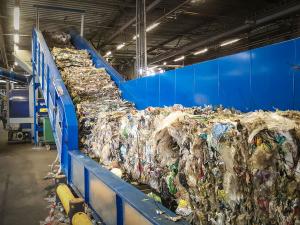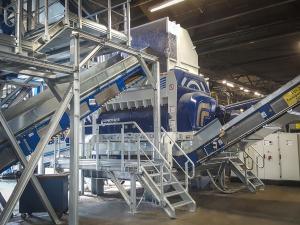Technical Report 2018-01-11
Content shown in the technical articles are the sole opinion and views of the authors or companies, which are not necessarily congruent to opinion and views of the editors.
|
Lindner Washtech: CeDo opts for Lindner washing technology for the production of its high-grade regrind material Harald Hoffmann, LINDNER reSource GmbH Blow-moulded films are highly demanding products, and consequently the use of recycled material in their production represents a major challenge. Impurities in the feed material necessarily lead to production faults that can range from specks and minor defects in the tubular film through to production stoppages. Nevertheless, the CeDo Group, which is based in the English town of Telford and is regarded as one of the European market leaders for bin liners and garbage bags, uses exclusively recycled material in its blown film extrusion lines. It does this out of conviction: "We give the plastics a genuine second chance," says Ton Emans, Managing Director of the recycling division at the Dutch site of Geleen. "It only really functions so well because we know exactly how plastics have to be prepared for processing." The key to success is the correct washing technology, which is why CeDo Recycling recently purchased a complete washing line from specialists Lindner washTech GmbH from Großbottwar in Germany.  Post-consumer film waste is the starting material for processing at CeDo. (Photo: Lindner Recyclingtech) Bin bag production instead of downcycling  The central component of CeDo´s treatment plant is the new Rafter from Lindner washTech. (Photo: Lindner Recyclingtech) Rapid installation of the overall solution In order to attain the high output quality needed for blown film extrusion, the CeDo Group's recycling plant in Geleen operates various washing units, the youngest of which was engineered and installed by Lindner washTech. This was done within a very short time window defined by the customer and with a limited amount of space. "We had very precise idea of the new plant, which not only had to be perfectly integrated into our existing infrastructures, but also had to be ready for use within the shortest possible time," admits Ton Emans and praises his supplier: "Lindner washTech proved to be a very reliable and punctual partner, who satisfied our demands completely." Peter Vranken adds: "We are very pleased indeed with the present solution and are convinced that this is a washing unit equipped with the most sophisticated technology on the market." The starting element of the overall unit is a chain-type conveyor that picks up the supplied film bales and conveys them to the pre-shredder, a Jupiter 1800. Here, a newly developed rotor with 145 x 145 mm blades opens the bales and undertakes an initial shredding to produce pieces of film as uniform as possible with a size of around DIN A4. The material is then taken to an 80 m3 material bunker in order to ensure a constant material flow for the subsequent NIR sorting. Via a ballistic screen, fines smaller than 30 mm are separated off, and the pre-shredded films are then conveyed through two NIR sorting stations, where the LDPE films are, in the first step, sorted positively and in the second step, negatively. "This results in 99 % purity of the necessary material fraction, which will later guarantee the high quality of the CeDo products," says Peter Vranken. The sorted fraction is then taken to the Komet 2800 single-shaft shredder, which, with a throughput of 6 t/h, reduces the pieces of film to smaller particles with a size of around 30 mm in a single step. Characteristic of the Komet are its rugged and low-maintenance work mode and its individual adjustability. The counter-knives, which can be adjusted easily and quickly, ensure precise cutting and, like the rotor blades, are readily accessible thanks to the famous Lindner maintenance flap. All in all, it is a very economical solution, particularly as no downstream cutting mill is required, thus saving further costs and space. Rafter ensures high economic efficiency After the shredding, the film flakes are conveyed to the Rafter. This latest new development from Lindner washTech works with an innovative concept in which the material does not – as is usually the case – float on the water but is effectively cleaned under water. "The unwanted substances and the particles adhering to the plastic that are heavier than LDPE sink in the washing zone and are directly separated off," explains Harald Hoffmann. The advantage is that these separated solid materials are eliminated during the first processing step and do not have to be separated off in a complicated procedure during water treatment. "Every hour, around 100 kg of contaminants and particles adhering to the plastic like sand are separated off in the Rafter. The washing process in the Rafter is not only highly effective, it is also, because of the gentle process, not subject to disruption and wear and tear, which in turn benefits the overall efficiency of the unit. After a friction washer and the graviter, in which the separation is made by density, the material flow is split up into two lines and taken to the mechanical dryers. This is where the final cleaning – e.g. to eliminate paper residues – and subsequent thermal drying to approx. 6 % residual moisture takes place. The cleaned material is then conveyed to silos where it is homogenised and is thus ready for re-extrusion. CeDo processes more than 100,000 tons a year into film for bin liners and garbage bags. Around a third of its input material for this is produced by the company itself in its modern and economical washing and processing plants. It goes without saying that the quality must be absolutely right. Lindner Washtech GmbH Häldenfeld 4 Phone: +49 (0) 7148 160538-0 Internet: www.lindner-washtech.com |
 back to the list back to the list |  back to top back to top |





